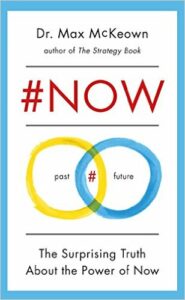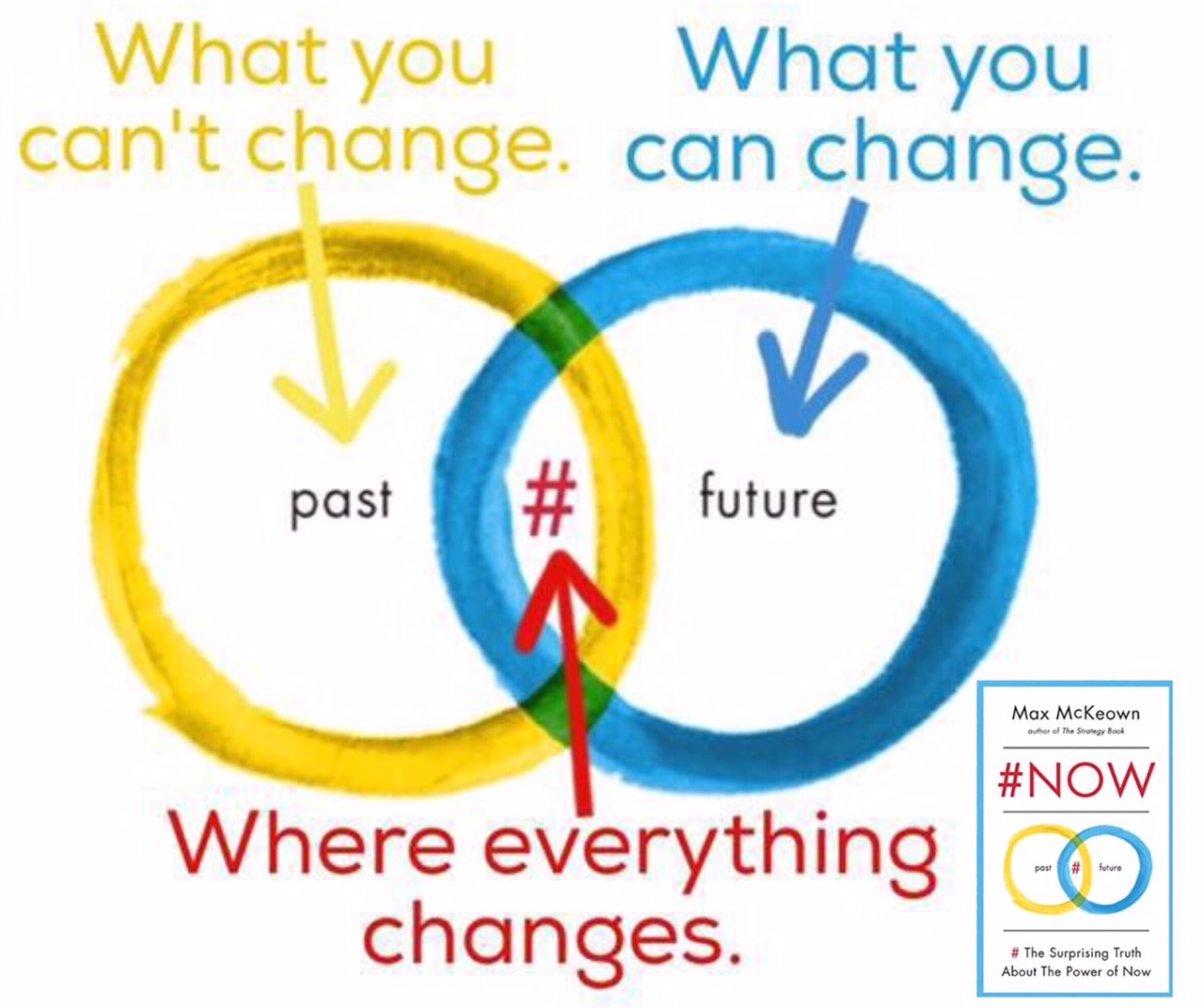Are you overwhelmed and stressed?
Stuck?
Finding it difficult to make decisions?
Dr. Max McKeown is known as an author, a strategist, and a speaker. His new research is all about the power of now, outlining personal strategies to live better in the now. We can all learn to be more Nowist and increase our satisfaction even as we pursue our goals. No more endless worrying. No more feeling stuck.
I recently asked Max to share more about his newest book, #Now: The Surprising Truth About the Power of Now.
The Power of #Now
This book is different from your previous work. What led to your study of the power of #Now?
All we’ve got is #Now! You, me, everyone. This is something we all have in common. Each moment of Now is about 3 seconds long, which means that your life is composed of about a billion moments. Our past is made of moments we can’t change; our future is made of moments that we can change. And Now is where you can make all the changes that will shape your life.
You’ll see that the circles on the cover represent the past and future while the # represents Now. It’s when your life is experiences, and action can be taken or not taken. And the book is about finding joy in moving forward. And so the book is also about the psychology of motivating yourself because motivation means to be moved.
Lean Towards Action
What’s a Nowist mindset? What are some of the characteristics of a Nowist?
The Nowist mindset is about the ability and desire to always keep moving forward! And because it’s about a flexible mindset, rather than something fixed, we can all be a little bit more Nowist.
For most people, most of the time, it is better to lean towards action rather than inaction. It’s more productive and ultimately more enjoyable to listen to the voice telling you to keep moving rather than to slow down. And its healthier to embrace and use the spontaneous energy of life rather than complain, slow down or stop.
Nowists tend to take pleasure in the work itself; they don’t just wait until the job is finished. And that means they get more enjoyment out of everyday living and working, even when that includes disappointment or crisis. They are hard to stop and benefit from a powerful do-it-now energy. They roll with the punches and demonstrate what the book refers to as a ‘feisty spirit of survivorship’ even when faced with the worst that life has to offer.
Contrast that with a Thenist mindset.
We all have this amazing, really useful, ability to remember the past and imagine the future. The problem comes when you spend too much time and energy worrying about things rather than taking action to make things better. Some people try not to think about what they need to do next because they are too harsh on themselves. Other people think they are powerless, so they give up rather than figuring out useful next steps. And others forget to take joy in the day-to-day which means they are only kind of happy at the end of the task, for two seconds before worry or ambition sets in. Living as a Thenist can be very tiring and not much fun – you might miss out on living.
Believe You Can Make Good Things Happen
How is this related to optimism?
In a way, a Nowist mindset is about active optimism. You don’t just passively pretend that good things will happen. Instead you believe that you can make good things happen. And then you take action that will lead to a better future.
We need the ability to consider the past and the future, and we benefit when we can see our actions as connected with what happens to us. The best things are likely to happen when we combine the ability to look back and look ahead with the willingness to leap into action. We look while leaping, and leap while looking.
Of all of the studies you cite in your research, what surprised you most?
There were so many useful studies!
One surprising finding was that doing work quickly, under time pressure, doesn’t necessarily reduce the quality of your work. It may add to your stress levels, but if you embrace the speed as enjoyable, then those downsides disappear.
The research showed that speed and interruptions, the things people complain about, aren’t really a problem if you embrace them. It also demonstrated that, past a certain point, more time and thought doesn’t necessarily improve decisions or outcomes. Slow thinking has been praised, but fast, effortless decisions can often be just as accurate, and have the added benefit of speed.
This is what people do in a Nowist mindset. They trust themselves to make smart, fast decisions. In another series of studies, doctors and nurses in emergency rooms who made faster decisions often had better outcomes. This was because they recognised the deep gist of the patients’ needs rather than just the shallow facts.
Change Your Approach
Is it possible to change your approach to change and movement?
 Yes! As we discussed earlier, we can all be a little more Nowist. We can learn to practice a kind of life Parkour, you know the urban free-running you see in action Movies like James Bond. These athletes jump off buildings and past obstacles as quickly and smoothly as they can. The term Parkour means ‘the art of movement,’ and Nowists also seek to find an art to movement in life.
Yes! As we discussed earlier, we can all be a little more Nowist. We can learn to practice a kind of life Parkour, you know the urban free-running you see in action Movies like James Bond. These athletes jump off buildings and past obstacles as quickly and smoothly as they can. The term Parkour means ‘the art of movement,’ and Nowists also seek to find an art to movement in life.
In another set of studies, people who were facing big changes at work who adopted a Nowist mindset were almost thrilled to experience those changes. And because they thought change was interesting, they were quicker to find excitement, joy and opportunities. That doesn’t mean that all change is good; some is bad, stupid or ineffective, but it does mean that seeing change as interesting will help you succeed.
One of the most fascinating truths in the book is that simply by remembering a time we felt powerfully Nowist can help us feel and act like a Nowist. And it’s a power-habit that can keep us moving forward.
The Nowist and Thenist Conflict
How do the Nowist and Thenist mindsets interact on a typical team? What are the points of contention and stress?
As you can imagine, people see things quite differently, and this will also depend on the kind of Nowists or Thenists you have on the team. For example; Action Nowists want to move fast and get things done. Whereas Power Nowists are motivated by their desire to confirm their own competence: they want to make things happen.
The worst thing for people in a Thenist mindset is possibly to be surrounded by other Thenists. Then you get the YOLO Thenist hiding from the future, the fatalist Thenists passively wringing their hands and the chicken-licken Thenists running around afraid of everything and achieving nothing.
The evidence is that when people discover more about their Nowist and Thenist natures, they can learn to appreciate the way others feel. Then they can contribute as a blend of looking and leaping. People who find it easier to be Nowists can reassure with their powerful momentum. People who are more naturally Thenist can learn to offer actionable insights without slowing progress. Nowist want to lend their talents to teams that will help them go faster.
In some ways, your book seems to offer an alternative to other ways of dealing with living in the present, like mindfulness. Was this deliberate?
Listen, Skip, you don’t need me to tell you that mindfulness specifically – and meditation, more generally – have proved popular. They offer the kind of breathe-in-breathe-out exercises that appear to help many people expand their sense of the present. This book acknowledges the importance of breathe-in-breathe-out and then focuses on what it takes to start moving and keep moving, fine tuning your stress clock so you are neither underpowered nor overwhelmed. And to do that, it uses the latest findings about our human psychology that can transform emotion, even negative emotion, into worthwhile forward facing action. Action with joy and purpose.
Don’t wait until you feel strong to start doing. Start doing and you will feel more powerful. You may not be a Super-Nowist, or even want to be, but there’s so much to be learned from them about how to enjoy your billion moments of #NOW.
#Now: The Surprising Truth About the Power of Now




